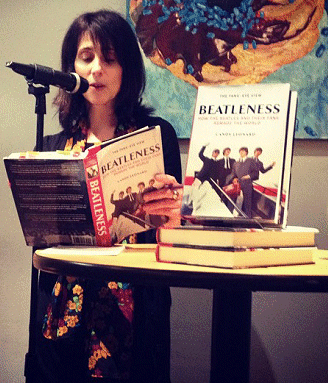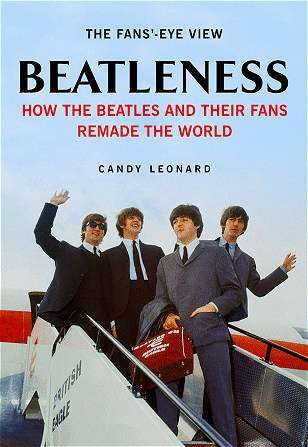Sixties
City presents
a wide-ranging series of
articles on all aspects of the Sixties, penned by the creator of the iconic
60s music paper Mersey
Beat
|
Sixties
City presents
a wide-ranging series of
articles on all aspects of the Sixties, penned by the creator of the iconic
60s music paper Mersey
Beat
|
|||||
|
| B.H:
Did the name ‘Beatleness’ already exist or did you create it, making a new
word in the English language? How important or how difficult was it thinking
up a title? Did it come at the beginning or end, or in the process of writing?
CL: I coined the term “Beatleness” and created the domain name Beatleness.com in 2004. I had an early concept for the book at that time and I realised there was no word to describe The Beatles essence as artists, the powerful emotions they elicit, and their pervasive, familiar presence as a historically unprecedented cultural force. BH: It’s an interesting inspiration to tie The Beatles in with the timeline of the period – did you find this provided an additional insight into the progress of the group and the reason they became so unique in fans eyes? CL: Growing up with The Beatles in real time, having them as a constant presence in your life for six years - as was the case for American fans - was one of the most defining experiences for the baby boom generation. By holding a magnifying glass up to that six-year time line, we can see how The Beatles' evolution as artists, the maturing of the fan base, and the sociopolitical events of the period were all intertwined. There’s no doubt that The Beatles’ constant evolution was a large part of their appeal. They were a reliable source of delight in that they were always new and always exceeded expectations. The joyful anticipation of the next release, wondering how The Beatles would sound and look, was an extraordinary feeling. There was something very personal and intimate about it. Yet, at the same time, it was a shared experience that created a strong sense of community and generational identity among first-generation fans that exists even to this day. Perhaps George Harrison said it best: “The Beatles saved the world from boredom.” BH: Your book was published almost fifty years after the events you researched. Was there a reason for such a very lengthy time gap, or did you find that the time was ripe? CL: Though I coined the term Beatleness in 2004 and began work on the book that eventually became Beatleness in 2013, my interest in writing about The Beatles and their impact from a sociological perspective goes back many years. I do think the time was ripe because the fiftieth anniversary was approaching. It always struck me as odd that there were no books about Beatles fandom since fans were such an important part of the story. BH: I was intrigued by the fan who became scared by a headline ‘Beatles Invade America’ because he didn’t know who they were. What were some of your own favourite fan interviews or comments? CL: I have many favourites, it’s hard to select. There’s a section where fans of different ages explain why they were “the best age” to be a Beatle fan, each age group insisting their experience was best. Those comments are funny and sweet, as are recollections of how particular songs were interpreted. If I had to choose, perhaps it would be this one, from a male fan born in 1949: “When I think about them, it’s more like a feeling of wonder. I wonder how all of us were so lucky that something as great as The Beatles occurred in our lifetime.” |
 |
 |
BH:
What surprises did you have or conclusions you
made when writing the book. Were there any further insights you gained which
you weren’t aware of before? CL: I knew fans had very strong feelings about The Beatles, and wanting to document those feelings is one of the reasons I wrote the book. But actually hearing fans articulate those feelings was very moving. Many spoke of The Beatles as siblings, or surrogate parents. Many said The Beatles influenced them more than anyone else in their lives. Many spoke about how The Beatles got them through very hard times, even through thoughts of suicide. Fans spoke with great gratitude about how The Beatles were always there for them, offering support. Another interesting finding was how gender and age determined how fans related to The Beatles. Fans often say The Beatles provided the soundtrack for their lives, but the interviews revealed something much more profound. Soundtracks are in the background; The Beatles were very much in the foreground, an integral part of fans’ daily lives. BH: Which fans did you find the most intriguing? CL: Perhaps I’m biased because I was a young fan (7½ when The Beatles entered my life), but I was especially moved by some of the interviewees who were seven, eight, nine, ten years old in 1964. Not only did I find their stories personally affirming, but their narratives illustrate an important point about The Beatles influence and cultural authority. The younger you were when you started following them, the more profound their impact. We often forget that most first-generation fans were children and pre-teens, not teenagers. BH: Professionals, such as yourself as a sociologist, generally write academic books, which are basically rather difficult to read for the layman. Writing in the style that the normal reader can associate with appeals to a wider audience. Did you ever consider going along the academic route? CL: I wanted the book to be accessible to fans of all ages and backgrounds. At the same time, I knew that documenting the fan experience, and drawing on social theory, would be a significant contribution to Beatles scholarship. As I discuss in the preface, I had the sense from a very young age that I was witnessing an extraordinary phenomenon and knew I would write about it someday. While pursuing my Masters and PhD, I studied sociology, child development, gender, media, and social change, all of which I draw on in the book. I think what makes Beatleness unique is the sociological approach itself, which zooms in on the details but then zooms out for a comprehensive analysis that shows how everything is connected. When publishers read the proposal, they often asked, “Is this an academic or a trade book?” My intent was that it be both, which is not how publishers typically think. That’s another reason it took a while to get it out there. But fans of all ages appreciate the book and it’s also being used as a text in college classes, so I guess I succeeded. BH: What conclusions did you draw from the fact that fans could be so dedicated so long after their original experiences? CL: What it comes down to, ultimately, is that first generation fans consider themselves extremely lucky, some say “blessed”, that they grew up with The Beatles; that The Beatles opened their ears to music and opened their eyes to new ways of seeing the world. Many say they could not imagine how different their lives would have been without the joy The Beatles consistently and reliably brought during fans’ formative years. The Beatles were a unique source of emotional, intellectual, aesthetic, and even spiritual nurturing. Many say The Beatles' impact on them was greater than that of family members. Fans’ ongoing dedication and love for the music makes sense when understood in this way. To call it mere nostalgia doesn’t begin to capture the singularity of it. |
|
Article
Text
|